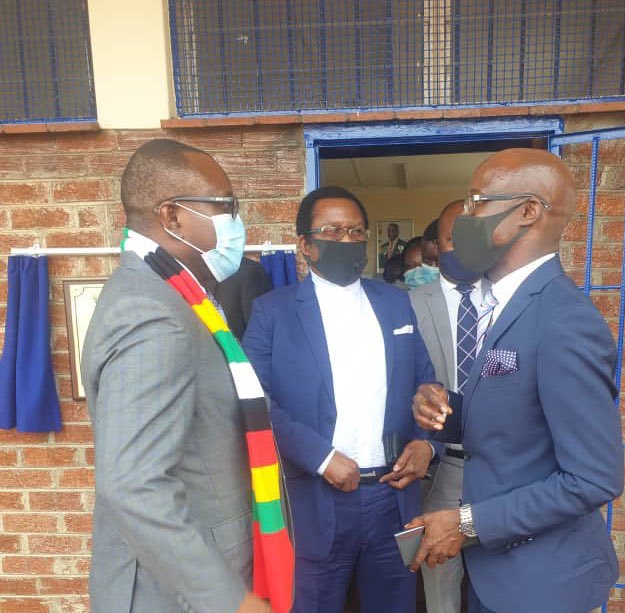As the world grapples with the COVID-19 pandemic, bridging the digital divide for the 3.6 billion people who remain off-line worldwide is being made possible through information communication technology, Dr. Jenfan Muswere, the Minister of ICT, Postal and Courier Services has said.
Dr. Muswere made the remarks at the official opening of the Sadza Community Information Centre (CIC) on 25 September 2020.
“As the COVID-19 pandemic reshapes the way in which we work, keep in touch, go to school and shop for essentials across the world, it has never been more important to bridge the digital divide for the 3.6 billion people who remain off-line worldwide. Indeed the call for universal access has never been more keenly felt than during the trying times we find ourselves in, due to the COVID-19 Pandemic,” Dr. Muswere said.
The Minister said whilst it is critical for those in urban areas to be connected, mobile broadband is equally critical for rural underserved and unserved communities to leverage economic, health and educational opportunities. Community Information Centres bridge this gap by providing rural communities with a multi-sectoral digital environment which criss-crosses agriculture, health, commerce and industry, mining, and even social issues that impact on families, especially peri-urban and rural families.
CICs provide opportunities for the people to try things out, to envision possible futures, whether it is in agriculture, mining, health or commerce. CICs also provide opportunities for possible trajectories for people to create alternative scenarios in all the different facets of life. This, indeed, provides an opportunity for the innovative and creative minds in the communities to push boundaries and come up with home grown solutions in health, or prototypes in industry or agriculture, among many other possibilities.
“For our young minds, CICs provide opportunities for play and simulation, whilst delivering the whole world at their fingertips. Community Information Centres, therefore, bring the global and the local together, a phenomenon referred to as “globalization”, which nurtures a global mindset and reach among our children, whilst at the same time they are able to accommodate our local cultures, values, ideals, and the needs of our local communities,” Dr Muswere said.
Speaking at the same occasion, Dr. Gift Machengete, the Director-General of the Postal and Telecommunications Regulatory Authority of Zimbabwe (POTRAZ) underscored the fact that ICTs accelerate progress towards every single SDG and, in particular towards SDG 9 of promoting inclusivity and fostering innovation and also bridges the digital gap.
He said the world is experiencing tremendous digital transformations, which have seen the emergence of a host of new technologies. This technological revolution has been further accelerated by the COVID–19 pandemic, which has teleported businesses and communities from the physical space to a virtual space.
“The roll-out of Community Information Centre, therefore, excites me as such centres ensure that no one is left behind in the virtual world – such centres ensure that rural communities are at par with cities in terms of access to information. It is for these reasons, that I consider it a privilege and indeed an honour to be addressing you at this glorious occasion – the launch of Sadza Community Information Centre.
“Ladies and gentlemen, apart from setting up Community Information Centres, POTRAZ is also assisting in the fight against COVID–19 by coordinating ICT industry efforts towards equipping the two national COVID–19 call centres established by the Ministry of Health and Child Care and the Ministry of Information, Publicity & Broadcasting Services. Additionally, the Authority donated rubbish bins to city councils for deployment at quarantine centres and shopping centres. POTRAZ also distributed personal protective equipment (PPE) to the less privileged to ensure that everyone is protected,” Dr. Machengete said.
Community Information Centres remain the biggest contribution to the fight against COVID-19 as they give communities access to accurate information about the deadly Corona Virus – how to avoid contracting it and what to do when one is infected.
Community Information Centres also provide platforms for students to conduct online lessons, so that they are not left behind in their studies. Furthermore, the business and farming communities can take advantage of the new wave of digital marketing and e-commerce to market and sell their commodities on the various digital platforms available. Therefore, through the utilisation of CICs, community members can circumvent the negative effects of COVID – 19 and continue living their normal lives.
Twelve (12) CICs were established in Mashonaland East Province with nine (9) of them now operational. The nine (9) operational CICs are Broomley, Juru, Beatrice, Mudzi, Murehwa, Sadza, Mutawatawa, Mutoko and Hwedza.
The Universal Services Fund has carried out Passive Telecommunication Infrastructure Projects throughout the country. The main objective of the project is to provide telecommunication services to underserved rural areas in Zimbabwe.
Passive infrastructure refers to non-active facilities provided at a telecommunications site to support the provision of ICT services to the surrounding areas of the site e.g. Solar Power (Photo Voltaic Modules), tower, diesel engine generators, power back-up batteries, access roads, perimeter fence, etc. After completion of the project, the infrastructure is shared by all operators, with one of the nominated as the site owner for the purposes of maintenance, security, and general upkeep of the site.
To date, USF has funded and constructed fifteen (15) shared base station sites countrywide.
Five (5) Multi-Operator Radio Access Network (MORAN) were constructed and operationalised in 2018. The Base Station equipment [hardware] was donated by Huawei Technologies of China. Site construction and equipment deployment was funded by the USF.
Mashonaland East province has a total of one two hundred and sixty-seven (267) 2G base stations, one hundred and ninety-four (194) 3G base stations and fifty-nine (59) LTE base stations deployed across the province. Cognisant that MNOs would naturally deploy where commercial viability is assured, POTRAZ, through the Universal Services Fund, intervenes through various means to ensure that all communities are covered by the Network signal. Within the province, POTRAZ deployed shared sites to extend mobile network coverage to underserved areas.
The shared sites are Pfungwe and Chiunye.
